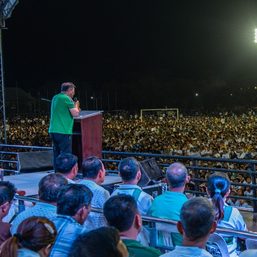SUMMARY
This is AI generated summarization, which may have errors. For context, always refer to the full article.

MANILA, Philippines – Once a horde of flies starts swarming on food, most people would think its use has come to an end.
But not so for Davao-based startup LimaDOL, who thinks flies clustering on food is a promising beginning to help solve the country’s worsening waste crisis.
LimaDOL, which means five-day-old larvae, is a private company that works on composting food waste using black soldier flies (Hermetia illucens).
It is founded by agricultural engineer Peter Damary, a Swedish national based in Davao who saw the potential of black soldier flies in reducing food waste.
Damary founded LimaDOL in 2019, but he told Rappler that he got the idea of using black soldier flies to process food waste way earlier.

When he was still working as a consultant on regional foods in Cambodia, Damary read a Food and Agriculture Organization (FAO) report where he got the idea.
“I was reading an FAO report explaining how we can’t continue consuming meat protein the way we do for a variety of reasons, mainly for environmental reasons. It was explained how [in] many cultures…sometimes the biggest source of protein [come] from insects. In there was a chapter on black soldier fly and composting, and then using the insect protein to feed chicken,” Damary told Rappler.
His interest piqued by what he read, he decided to use his family’s savings to start LimaDOL in Davao, where he and his wife, former United Nations special rapporteur Cecilia Jimenez-Damary, live.
Different
A common misconception about black soldier flies is that it is also a pest like the common housefly, which, according to a University of Florida article, transmits pathogens like viruses, bacteria, fungi, protozoa, and nematodes that they pick up from garbage, sewage, and other sources of filth.
Houseflies transfer these pathogens through their movement from filthy objects to human food, which could cause outbreaks of diarrhea and shigellosis. Houseflies are also implicated in the transmission of food poisoning, typhoid fever, dysentery, tuberculosis, anthrax, ophthalmia, and parasitic worms.
Damary clarified this misconception and explained that black soldier flies are not the same as the common housefly.
One major difference between black soldier flies and common houseflies is that the latter still consumes food in its adult form during the time when it could fly anywhere and spread pathogens. However, black soldier flies only eat when they are still in their larval stage, limiting their movement.
“A black soldier fly is different from a normal fly. It doesn’t have a mouth and it doesn’t approach humans, so it doesn’t carry illnesses. It only lives for around one week to 10 days and then it dies. Basically, it lives to reproduce,” he explained.
According to Damary, female black soldier flies lay around 500 to 900 eggs. In LimaDOL, Damary said they hatch these eggs and raise the larvae until they are five days old – that is when they are put in food waste, which they eat and turn into compost.

He said that after 12 days, they select and keep some larvae for breeding for another batch of composting.
Vermicomposting
The process of feeding black soldier flies with food waste, which they turn into compost, is called vermicomposting.
According to North Carolina State University’s (NCSU) website, vermicomposting is a process of converting organic materials like food waste “to a valuable soil amendment and source of plant nutrients.”
Cornell University’s website describes soil amendment as “any material added to the soil to improve its physical and chemical properties.” There are two types of amendments: organic and inorganic. Examples of organic amendments are manure and compost, while chemical fertilizer is an example of an inorganic amendment.
Turning food waste into compost is a process that usually relies on earthworms and microorganisms to consume the organic materials. The black soldier fly is one of the organisms that can be used in vermicomposting.
The black soldier fly is described as “an efficient decomposer of food waste” in research published in the Journal of Ecology and Environment of Biomedcentral.
Decomposers like black soldier flies make vital nutrients by breaking down complex organic materials from food wastes into simpler substances like water and carbon dioxide, and simple compounds containing nitrogen, phosphorus, and calcium, according to an encyclopedic entry of National Geographic. These are substances that plants need to grow.
Common practice
Using black soldier flies to make compost out of food waste is not new.
Research on how to properly use black soldier flies goes as far back as 2005 when researchers from NCSU used the specie in a waste management system.
In 2021, a group of African researchers published a study on the compatibility of black soldier fly-composted organic fertilizer in three sub-Saharan vegetable crops. The researchers found that the fertilizer would improve soil health, boost yield, and nutritional quality of vegetable crops.
The Straits Times reported that Sustainability @ Tampines Park, a community-based initiative in Singapore, has a black soldier fly facility to convert food waste into fertilizer, which it uses in a vegetable farm. The initiative also uses black soldier fly larvae as food for a tilapia fish farm.
Kahariam Farm in Batangas began its own production of black soldier flies in 2020 to be used on its farm. The farm is also experimenting on using black soldier fly larvae as feeds for chicken and fish.
Not just for composting
Aside from eating food waste, black soldier flies can also be used as food for livestock. The larvae that aren’t selected for breeding are turned into “insect protein” – food for livestock such as chickens.
“The larvae itself, you can directly feed to chicken. They really love it because that’s what they get from nature. It’s also got a lot of microbiomes, which is very healthy for the chicken. You can also dry it and mix it with other ingredients to make a more complete meal for chickens,” Damary said.

He said that the compost, which they named Booster Frass Fertilizer, is bought by farmers, while the insect protein, of which LimaDOL has two types (live fruit larvae and dried fruit larvae), is usually bought by fishermen.
A community effort
To get the food waste that it turns into compost, Damary said LimaDOL has worked with several nongovernmental organizations (NGOs), communities, and local government units (LGUs).
LimaDOL is part of a group of environmental NGOs called the Sustainable Davao Movement (SDM) – a group that consists of Ecoteneo, Break Free From Plastic, Ecowaste Coalition, and LimaDOL. These groups initiated zero-waste initiatives in Barangay Tacunan, where LimaDOL is based.
SDM is also part of a partnership project called PHINLA that aims to help LGUs improve their waste management systems. Damary said they are also working with PHINLA, which collects food waste from restaurants and markets and then gives it to LimaDOL.
LimaDOL is also a partner of the local governments of barangays Tacunan and Mintal. According to Damary, the LGUs collect the food waste and bring it to LimaDOL.

Worsening waste crisis
Zero-waste initiatives like those in Barangay Tacunan and Mintal are needed not only in Davao City but in the whole country.
According to a United Nations Environment Programme report, Filipino households generate 9.3 million metric tons of food waste annually.
A World Wildlife Fund report said that 2,175 tons of food end up in trash bins daily in Metro Manila alone. In Davao City, where LimaDOL is based, 700 to 750 tons of garbage are dumped in the city landfill, a report from the local government of Davao City said.
The Philippines can only recover and process a small fraction of all the food waste generated in the country because only 30% of all barangays in the Philippines have a Materials Recovery Facility (MRF), the Department of Environment and Natural Resources (DENR) had said in a Philippine Star report.
Republic Act No. 9003, also known as the “Ecological Solid Waste Management Act of 2000” requires every barangay or cluster of barangays to establish MRFs where food waste could be composted.
Operational MRFs in the Philippines have different capacities depending on their size. According to a paper published by the Asian Development Bank, MRF capacities range from less than one ton per day in small barangays to 200 tons daily in big cities.
This poses a problem since food waste composting company GreenSpace estimated that 52% of waste generated in the country is food waste.
The country also has a shortage of landfills where food waste commonly ends up, the DENR had said in a press release in February 2020.
Sustainability
Damary said that currently, LimaDOL can compost up to three tons of food waste a week, but he is aiming to expand the project.
“[LimaDOL] is still a very small organization. We do three tons a week, [compared to] the 300 metric tons a day that go to landfills. So, we are at the very beginning of the story. We want to grow and to have an impact on that 300 metric tons, hopefully, one day helping divert all those metric tons,” he said.
LimaDOL has the capacity of processing five to six tons of food waste a week, Damary said. This is why they are still on the lookout for other NGOs and LGUs that they could partner with to increase their production. LimaDOL is currently in talks with the local government of Davao regarding the possible expansion of its land space.
Aside from Davao, Damary said that Cotabato City also reached out to them for a possible partnership.
Through LimaDOL, Damary hopes that the concept of a circular economy can be introduced to the country. He explained that most economies right now are called linear economies. For him, this is an unsustainable type of economy because most of the products created will eventually become waste.
Through the composting that LimaDOL does, he said that some of the waste is recycled, given a new purpose, and reintroduced back into the system.
“We at LimaDOL consider ourselves central to that circular economy because of the ways we could bring waste back into the system,” he added.
To push for sustainability, Damary said segregation must be done at every stage of the waste management process – from trash bins to landfills.
Damary believes that when it comes to segregation, Filipinos are not “undisciplined” – it’s just that there’s no system in place that will guide them to properly do it.
“Lots of people say, ‘Oh, Filipinos are not disciplined.’ No, it’s not true. Filipinos are as disciplined and capable as anybody else,” the LimaDOL founder said.
Damary also said that Filipinos know that segregated trash is eventually mixed together in landfills, which is why they are hesitant to do it.
“That’s why it’s really important to place the systems to start informing people how to do things, and then, it works,” Damary said. – Rappler.com
Add a comment
How does this make you feel?




There are no comments yet. Add your comment to start the conversation.